AgriBiz
Floriculture Startups: Let’s revive the fragrance of Kashmir
Published
4 years agoon
By
BK Editor
A rapidly growing agri-industrial sector, Floriculture has an annual market share of Rs 15,000 crore in India with a yearly growth of 25%. Given the favourable climatic conditions, J&K has enormous potential for commercial floriculture. A detailed account of the present scenario of the sector and its prospectus of becoming a sunrise industry in Kashmir.


Economic aspect
Floriculture is a rapidly growing agri-industrial sector around the world, particularly as a potential money-maker for many countries. Many flowers and ornamental plants are planted for both domestic and international markets. They generate more returns per hectare area than any other agricultural commodity. The extraction of essential oils and the production of cost-effective products like Gulkand are both extremely beneficial. On a commercial scale, more than 145 industries are currently involved in flower cultivation. The establishment of the flower industry and perfume companies can contribute significantly to the reduction of unemployment. In 2014-15, the floriculture industry cultivated 248.51 thousand hectares of land. In 2016-17, the country exported 22086.10 MT of floriculture products to the world, valued at Rs 548.74 crores (US$82.05 million). Floriculture has become one of the most important commercial businesses in Indian agriculture due to considerable growth in demand for low-cost and loose flowers. India is ranked 18th in the world, with a 0.6 percent share of the global floriculture trade. Exports grew at a CAGR of 4.33 percent over the last decade. In the country as a whole, the domestic Indian market is growing at a 25% rate each year.
Aesthetic aspect
Landscaping is a billion-dollar-a-year industry in many states, and it ultimately adds to the monetary worth of any property. The health of a nation’s population is tied to its riches. We can safeguard the healthy development of our residents by offering open breathing spaces through bio-aesthetic planning and landscape gardening, as seen in Chandigarh. Horticulture therapy is a new level of horticulture science that uses garden, landscape plants, components of plants, and growing activity as tools to heal psychic debility. Bio aesthetic horticulture is emerging as a new occupational therapeutic tool to restore the lost rhythm and harmony to the human self or inner environment because the bio-force of plants offers a lasting solution to the problems of human bio-force. It’s used in psychiatric hospitals, general hospitals, physical rehabilitation centres, jails, schools, and senior living facilities.


Development of floriculture in India
The Indian government has designated floriculture as a sunrise sector with a 100% export-oriented status. Floriculture has become one of the most important commercial trades in agriculture as a result of the continual increase in demand. Floriculture is seen as a high-growth business in India. The liberalisation of industrial and trade policies set the door for the expansion of cut flower exports. Importing planting material of international standard was previously possible under the new seed policy. Commercial floriculture has been discovered to have a larger potential per unit area than other field crops, making it a profitable industry. The liberalised economy has encouraged Indian businesses to set up export-oriented floriculture operations in climate-controlled environments. In 2016-17, the Indian floriculture sector was worth Rs 9000 crore. In 2018, the Indian floriculture market was valued at Rs15700 crore. The market is expected to reach Rs 47200 crore by 2024, with a 20 percent CAGR between 2019 and 2024.
Rose, Jasmine, Orchid, Glardlya, Carnations, and Marigolds are popular commercial flowers with a total cropped area of 71 lakh acres in 2016-17. Since the last five years, it has grown at a CAGR of 25%. In 2016-17, total production was 22.36 lakh MT, with loose flowers accounting for over 69 percent of total production. India’s main export markets are the United States, Germany, the United Kingdom, the Netherlands, and the Arab Emirates.
Opportunities
The demand for flowers is expanding at a quick rate as the level of living rises and people’s lifestyles change as a result of socio-economic changes in India. Encouraged by the rapid increase in domestic demand, a substantial number of export-oriented floriculture projects are looking to the domestic market to sell their produce during lean export seasons. In various big cities and industrial townships, there is a rapidly growing demand for different varieties of flowers for institutional buyers such as star hotels, big organisations and corporate houses, churches, temples, mosques, travel agencies, hospitals, embassies and trade missions, foreign organisations and organisations in the hospitality industry, and so on. A burgeoning flower market at the local, national, and international levels, where demand exceeds supply and global demand is expected to expand at a rate of 15 percent to 25 percent per year. Because industrialised countries rely heavily on imports to meet domestic demand, their high manufacturing costs present an opportunity.
The majority of major flower-producing countries are now industrialised and have a tiny surface area. As a result, the cost of acquiring land is quite high, making it unappealing to establish floriculture units in these nations. As a result, India has a huge opportunity to capitalise on the floriculture industry.
Floriculture Startup opportunities in Kashmir


In the current context, the floriculture business has emerged as one of the most popular startup ideas. The economy has suffered a severe dip as a result of the COVID-19 outbreak, and many employees have lost their employment. Still, a large number of unemployed teenagers are looking for any unique company concept that will provide them with a source of income. This type of business has huge potential to survive and grow and prove mettle in the competitive environment.
Floriculture is a fantastic opportunity for anyone who loves gardening and wants to put their heart and soul into it. It is possible to get profitable financial results by operating a flower farming business or startup. Technical knowledge is not required for people interested in starting a floriculture business. Having the basic knowledge about floriculture and other simple concepts concerning running a business would be enough to commence this business anywhere in India.
Floriculture has been nurtured as a money-making Agri-business inside India’s geographical limitations.
Floriculture includes
- Annual, biennial & perennial ornamentals, such as cacti as well as other succulents
- Trees
- Shrubs
- Bromeliads
- Lawn and ornamental grasses
- Bamboos
- Climbers
- Bulbous plants
- Orchids
- Foliage
- Bedding
- Pot and house plants
- Palms
- Cycads
- Cut and loose flowers seed
- Bulb production of ornamentals
- Fillers
- Ferns
- Dried flowers or plant parts
- Other value-added products such as edible pigments, extraction of essential oils & their marketing, as well.
Steps for Floriculture Startup


Developing your Startup Business Plan
- Before initiating any business, you must fabricate a sound business plan.
- You must acquire cooling equipment such as a freezer to keep your flowers fresh and beautiful and increase their shelf life as the life span of flowers is otherwise small.
- You must also examine the manpower requirement that you might demand to design the floral arrangement and for the delivery purpose as well.
- Either you want to proceed ahead for a franchise or source to commence your business like flower companies or florists.
- There is no need for proper mentoring before initiating the floriculture business, as this is all about basic knowledge, and no bookish concepts can help you develop your potential to run this business.
- Create a well-structured plan before stepping ahead for starting a floriculture business in India. You may open your shop in your locality.
- If you are planning to transform your dream into reality, you would have to pen down your thoughts on paper and do proper planning before going ahead.
- Prepare the idea concerning the capital requirement for the floriculture business.
- Check out the crucial factors, such as the floral delivery platform to give the finishing touch to your business plan.
- You may also evaluate the staff requirements that you would have to prepare and leap forward to the floral arrangement plans and deliveries.
Government Programmes and Schemes
The Department of Agriculture and Cooperation, which is part of the Ministry of Agriculture, is the nodal institution in charge of floriculture development. It is in charge of developing and implementing national policies and programmes targeted at attaining rapid agricultural expansion by maximising the country’s land, water, soil, and plant resources. A thrust area for support is the production of cut flowers for export. The Agricultural and Processed Food Products Export Development Authority (APEDA), the nodal institution for promoting agri-exports, including flowers, has launched several programmes aimed at boosting the country’s floriculture exports. These include infrastructural development, packaging, market growth, airfreight subsidies for the export of cut flowers and tissue-cultured plants, database upgrades, and so on.100% Export Oriented Units are also eligible for incentives such as duty-free capital goods imports. Import duties on cut flowers, flower seeds, tissue-cultured plants, and other items have also been decreased. The installation of walk-in cold storage for export production has been permitted at international airports. At many international airports, initiatives have been initiated to aid exporters by offering cold storage and cargo handling facilities for perishable products. In cold storage units, a direct subsidy of up to 50% is also available. APEDA also provides a subsidy on improved packaging materials to encourage their use.
NABARD is offering financial support to hi-tech units at reasonable interest rates to encourage entrepreneurship in the floriculture sector. The government has launched several schemes to promote and develop the floriculture sector, including “Integrated Development of Commercial Floriculture,” which aims to improve traditional flower and cut flower production and productivity through the availability of quality planting material, as well as the production of the off-season and high-quality flowers through protected cultivation., improvement in post-harvest handling of flowers and training persons for scientific floriculture. Many state governments have established distinct ministries to promote floriculture in their jurisdictions.
The floriculture business is a great option for those who get fascinated and lured by the mesmerising beauty of flowers. It’s a business that holds immense potential in the current scenario. It provides an opportunity for the youth to take up floriculture as a startup and begin their journey of profitable business in Jammu and Kashmir. By gearing for this innovative business. By spreading joy and fragrance in people’s lives.
An agri-business expert, Naveed Bhat is the business development analyst at Innovation & Entrepreneurship Cell, SKUAST-Kashmir
You may like
-




RBI penalises Central Cooperative Banks Baramulla, Anantnag for violations
-




Editorial | J&K Budget 2025-26 – A Balancing Act
-




CII J&K Organizes Health Conclave 2024
-

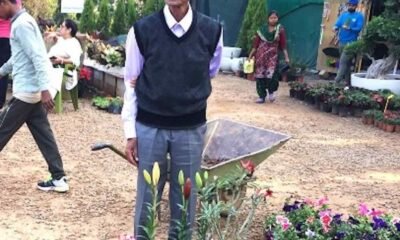


Kya kuchh tha jiske kehne ko: A tribute to father
-

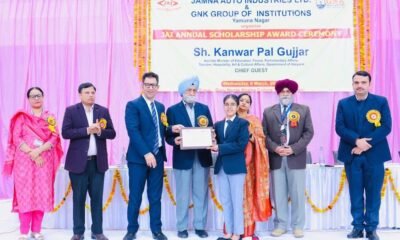


GNK hosts JAI scholarship distribution function
-

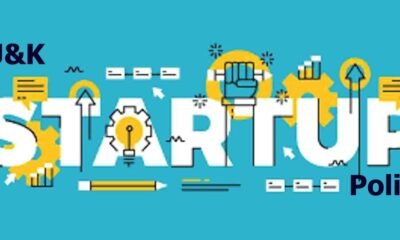


Administrative Council approves J&K Startup Policy 2024-27
AgriBiz
Building FPO Leaders: SKUAST-K, MANAGE Hyderabad complete trainers’ training
Published
5 months agoon
November 30, 2024By
BK Editor

BK News
Srinagar: The month-long Training of Trainers (ToT) program for Farmer Producer Organizations (FPOs), organised by Sher-e-Kashmir University of Agricultural Sciences and Technology of Kashmir (SKUAST-K) and Agriculture Department in collaboration with the National Institute of Agricultural Extension Management (MANAGE), Hyderabad, concluded successfully, marking a major milestone in capacity building for agricultural transformation in Jammu and Kashmir.
The program brought together some of India’s foremost agricultural business experts to train nearly 300 resource persons in eight batches. Designed under SKUAST-K’s HADP Project 20: Innovative Approaches for Promoting Agriculture in J&K, the initiative aimed to strengthen farmer organizations such as FPOs, Self-Help Groups (SHGs), Common Interest Groups (CIGs), and Primary Agricultural Credit Societies (PACS). The program covered topics like FPO formation, business planning, supply chain management, and market linkages.


Vice-Chancellor SKUAST-K, Prof Nazir Ahmad Ganai, who actively monitored the program, in his message stressed the importance of FPOs in transitioning J&K from subsistence farming to sustainable commercial agriculture. Drawing comparisons with advanced economies, he highlighted the urgent need to increase agricultural processing, which currently stands at just 2% in the region.
Prof Masood Saleem Mir, Associate Director Research and Principal Investigator of the HADP Innovative Extension Project, elaborated on the program’s objectives and logistics. “This training was designed to address the unique challenges faced by farmer organizations in J&K. By equipping participants with technical, managerial, and entrepreneurial skills, we aim to create a ripple effect where these trainers will mentor and guide farmers across the region,” he said. Prof Mir further highlighted the strategic collaboration with MANAGE Hyderabad and the Agriculture Production Department, which ensured the program’s success.
“Our aim is not just to train individuals but to build a system where farmers can access consistent support and practical solutions for their challenges. The comprehensive curriculum, covering everything from FPO formation to business sustainability, is tailored to meet the region’s specific needs,” Prof. Mir added.
The training, facilitated by MANAGE Hyderabad, featured country’s top expert in FPO formation, business planning and supply chain management. These experts provided strategic insights into FPO management, business sustainability, and innovative mobilization techniques, ensuring practical outcomes for the participants.
Participants praised the program for its practical orientation, stating that it had demystified the complexities of building successful FPOs. Many called for follow-up sessions focused on developing tailored, commodity-based business plans to enhance FPO effectiveness.
This initiative aligns with SKUAST-K’s vision to make J&K a model bioeconomy in the country, fostering a resilient and sustainable agricultural landscape. The university plans to replicate the program in the Jammu division, further extending its impact.
The event concluded with the distribution of certificates to the trainees and a pledge by all stakeholders to work collectively towards uplifting the region’s farming community.
AgriBiz
SKUAST-K innovator clinches Rs5lakh RKVY Raftaar grant
Published
1 year agoon
January 9, 2024By
BK Editor

BK News
Srinagar: An innovator from Sher-e-Kashmir University of Agricultural Sciences and Technology of Kashmir, Shaista Khan, has bagged Rs5lakh RKVY Raftaar grant for Herbodyne, an herbal toothpaste based on an indigenous Kashmir plant.
Presently pursuing PhD from the SKUAST-K’s Faculty of Forestry, Benhama campus has been awarded the grant under RKVY RAFTAAR, MANAGE, Hyderabad from Ministry of Agriculture and Farmer’s Welfare, Govt. of India. She was mentored by Prof TH Masoodi, Registrar SKUAST-K, Prof Imtiyaz Murtaza, Division of Basic Sciences and Humanities, Prof Parvez Ahmad Sofi, Prof. and Head, Div of FPU and Dr Nazir Ahmad Pala, Div of Silviculture and Agroforestry, Faculty of Forestry.
On talking to her, Shaista Khan says that it happened only due to the mentorship and support that she received from the mentors and the Faculty of Forestry, SKUAST-K. She expresses heartfelt gratitude to Prof Nazir Ahmad Ganai, VC SKUAST-K and Prof. T.H. Masoodi, Registrar SKUAST-K for providing an inspirational, motivational and unwavering support system. She also expresses her sincere thanks to her mentors Prof. T. H. Masoodi Registrar, SKUAST-K, Prof Imtiyaz Murtaza, Prof. Parvez A Sofi and Dr Nazir A Pala for their effective mentorship and for inspiring her with this innovative idea. She is also grateful to Dr Akhlaq Amin Wani, Prof.& Head, Div. of Natural Resource Management, Dr JA Mugloo, Head, KVK, Malangpora and Dr GM Bhat, Prof & Head, Silviculture and Agroforestry and other members of the faculty for their valuable support and encouragement. In addition, she says that she is very thankful to the NAHEP, SKUAST for providing financial assistance and SKIIE, SKUAST-K for their support and guidance.
AgriBiz
Vegetable Science: A Potential Area for Startups in J&K
Published
1 year agoon
December 14, 2023By
BK Editor



Dr Asima Amin Dr Baseerat Afroza Naveed Hamid
In a world grappling with the challenges of population growth, environmental sustainability, and a shifting focus towards healthier lifestyles, the potential of vegetable science in startups emerges as a beacon of transformative innovation. The intersection of agriculture, technology, and health has given rise to a myriad of opportunities for entrepreneurs to revolutionize the way we cultivate, consume, and benefit from vegetables.
As global consciousness veers towards sustainable practices and healthier food choices, startups delving into vegetable science are poised to play a pivotal role in shaping the future of our food systems. This introduction seeks to explore the diverse avenues where startups can harness the power of vegetable science to address pressing issues such as food security, nutritional health, and environmental impact.
From leveraging cutting-edge technologies in agriculture to developing novel plant-based food products, the potential applications of vegetable science are vast and impactful. This exploration encompasses not only the traditional aspects of farming and crop management but also delves into the realms of biotechnology, food technology and sustainable business practices.
We will delve into specific domains where startups can thrive, exploring how innovation in vegetable science can drive change in agribusiness, food technology, health and wellness, sustainability, and more. The goal is to unveil the untapped potential that lies within the realm of vegetable science, inspiring entrepreneurs, investors, and stakeholders to contribute to a more sustainable, nutritious, and equitable future.
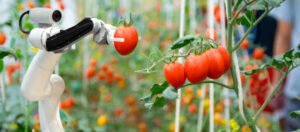

As we embark on this journey through the fertile landscape of vegetable science in startups, envision a world where the humble vegetable becomes a catalyst for transformative change, not only in our diets but in the very fabric of how we approach agriculture, technology, and the well-being of our planet.
STARTUP AREAS
Vegetable science can play a significant role in startups across various sectors, ranging from agriculture and food technology to health and sustainability. Here are some potential areas where vegetable science can contribute to startup innovations:
-
Ag-Tech Startups:
- Precision Farming: Utilize technology, sensors and data analytics to optimize vegetable cultivation, ensuring efficient resource use and higher yields.
- Vertical Farming: Develop indoor farming solutions using controlled environments, allowing year-round vegetable production in urban areas.
- Biotechnology: Explore genetic modification and breeding techniques to enhance the nutritional content, disease resistance,and overall quality of vegetables.
-
Food Technology:
- Plant-Based Alternatives: Create innovative plant-based products using vegetables to meet the growing demand for vegetarian and vegan options.
- Food Preservation: Develop technologies for extending the shelf life of vegetables, reducing food waste, and ensuring freshness during transportation.
- Nutritional Enhancement: Explore methods to fortify vegetables with additional nutrients to address specific health concerns.
-
Health and Wellness:
- Functional Foods: Develop vegetable-based products with specific health benefits, such as anti-inflammatory, antioxidant or immune-boosting properties.
- Nutraceuticals: Investigate the medicinal properties of vegetables and create supplements or health products based on their natural compounds.
-
Sustainability:
- Circular Economy: Implement sustainable practices in vegetable production, such as recycling agricultural waste, utilizing organic fertilizers, and adopting eco-friendly packaging.
- Zero-Waste Solutions: Develop technologies to utilize every part of vegetables, minimizing waste and creating by-products for various applications.
-
Smart Farming and IoT:
- Smart Sensors: Integrate sensors to monitor soil conditions, water levels, and plant health, allowing farmers to make data-driven decisions for optimized crop management.
- IoT in Supply Chain: Implement IoT technologies to track and monitor vegetables throughout the supply chain, ensuring quality, reducing losses, and enhancing traceability.
-
Education and Consulting:
- Agribusiness Consulting: Startups can provide consultancy services to farmers on adopting modern vegetable cultivation techniques, sustainable practices, and technology integration.
- Educational Platforms: Develop online platforms to educate farmers, entrepreneurs, and consumers about the latest advancements in vegetable science, sustainable agriculture, and healthy eating.
-
Community and Social Impact:
- Community Gardens: Startups can facilitate community-based vegetable gardens, promoting local produce, community engagement, and sustainable agriculture practices.
- Social Enterprises: Combine vegetable science with social impact by addressing issues like food insecurity, promoting fair trade, and supporting local farmers.
IMPACT OF STARTUPS IN VEGETABLE SCIENCE
The potential of vegetable science in startups offers a range of benefits that extend beyond economic success. These ventures can positively impact various sectors and address pressing global challenges. Here are some key benefits:
-
Sustainable Agriculture:
- Resource Efficiency: Startups can develop technologies and practices that optimize resource use, such as water, fertilizers, and land, contributing to sustainable and environmentally friendly agriculture.
- Reduced Environmental Impact: By promoting organic farming, minimizing chemical pesticide use, and adopting eco-friendly practices, vegetable science startups can contribute to reducing the environmental footprint of agriculture.
-
Innovation in Crop Management:
- Increased Yields: Precision farming technologies and genetic modifications can lead to higher crop yields, addressing the growing demand for food in a world with an expanding population.
- Disease Resistance: Genetic modifications can enhance the resistance of vegetables to pests and diseases, reducing the reliance on chemical pesticides and promoting healthier crops.
-
Health and Nutrition:
- Improved Nutritional Content: Biotechnological advancements can be harnessed to enhance the nutritional content of vegetables, providing consumers with healthier and more nutrient-rich food options.
- Functional Foods: Startups focusing on functional foods can contribute to improved public health by developing vegetable-based products with specific health benefits.
-
Economic Opportunities:
- Job Creation: The growth of vegetable science startups can lead to job creation across various sectors, including agriculture, technology, research, and product development.
- Market Expansion: Innovations in vegetable-based products can open up new markets and cater to the increasing demand for sustainable and plant-based alternatives.
-
Food Security and Accessibility:
- Year-Round Production: Vertical farming and controlled environment agriculture enable year-round vegetable production, reducing dependence on seasonal harvests and improving food security.
- Localized Farming: Community-based initiatives and startups focused on local farming contribute to localized food production, reducing the need for extensive transportation and storage.
-
Technological Advancements:
- Smart Farming: Integration of technology in agriculture, such as smart sensors and IoT devices, leads to more efficient and data-driven farming practices, improving overall productivity.
- Traceability and Transparency: Technologies for supply chain traceability enhance transparency in the food production process, building consumer trust and meeting the demand for ethically sourced products.
-
Community Engagement and Social Impact:
- Community Empowerment: Initiatives like community gardens and social enterprises create opportunities for community engagement, fostering a sense of empowerment and ownership among local populations.
- Addressing Food Insecurity: Socially focused startups can play a role in addressing food insecurity by promoting sustainable and affordable vegetable production methods.
-
Education and Awareness:
- Knowledge Dissemination: Educational platforms and consulting services contribute to disseminating knowledge about sustainable agriculture practices, technology adoption, and healthy eating habits.
- Empowering Farmers: Agribusiness consulting services empower farmers with the knowledge and tools to adopt modern practices, improving their livelihoods and the sustainability of their operations.
Conclusion
The potential of vegetable science in startups holds tremendous promise and presents exciting opportunities for innovation, sustainability, and societal impact. As the world grapples with challenges such as food security, environmental sustainability, and public health, leveraging the power of vegetable science can pave the way for transformative solutions.
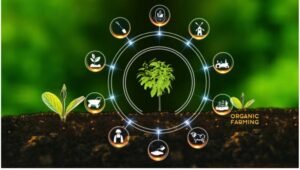

Startups focusing on vegetable science can contribute significantly to agricultural advancements by developing resilient and high-yielding vegetable varieties through breeding techniques, genetic engineering and precision agriculture. This not only addresses global food demand but also aids in the conservation of resources, reduction of environmental impact, and mitigation of climate change.
Furthermore, the integration of cutting-edge technologies, such as artificial intelligence, robotics, and data analytics, into vegetable science can enhance crop monitoring, optimize resource utilization, and streamline supply chain processes. This not only increases efficiency but also opens new avenues for automation and smart farming practices.
The nutritional value of vegetables also plays a crucial role in promoting public health and wellness. Startups can explore innovative approaches to enhance the nutritional content of vegetables, develop functional foods, or create new plant-based products to meet the growing demand for healthy and sustainable diets.
Moreover, the rise of alternative protein sources, including plant-based proteins derived from vegetables, presents a unique opportunity for startups to contribute to the burgeoning market of sustainable protein options. By developing novel processing techniques and improving the taste and texture of plant-based products, these startups can cater to the increasing consumer preference for environmentally friendly and ethical food choices.
In Nutshell, the convergence of vegetable science, technology, and entrepreneurship holds the potential to revolutionize the agriculture and food industry. Startups that embrace this intersection can not only drive economic growth but also make significant contributions to addressing some of the most pressing challenges facing our planet. As the world continues to recognize the importance of sustainable and nutritious food systems, vegetable science startups stand at the forefront of creating a more resilient, efficient, and healthier future for all.
SKUAST K under the ambit of SKUAST K Innovation, Incubation & Entrepreneurship Centre is always ready to support new young minds or budding entrepreneurs who wish to start their enterprises or have some novel or great ideas to take it forward to convert them into minimum viable products or technologies in vegetable science field can come and take advantage of this Centre situated in SKUAST K main campus Shalimar.
The authors are faculty at SKUAST-K



RBI penalises Central Cooperative Banks Baramulla, Anantnag for violations



Editorial | J&K Budget 2025-26 – A Balancing Act


Building FPO Leaders: SKUAST-K, MANAGE Hyderabad complete trainers’ training


CII J&K Organizes Health Conclave 2024


SKUAST-K to hold mega Science Summit on Aug 23-24


Haryana Biodiversity Board commemorates International Biodiversity Day at GNK Group Of Institutions


Kya kuchh tha jiske kehne ko: A tribute to father


GNK hosts JAI scholarship distribution function


Administrative Council approves J&K Startup Policy 2024-27


How to begin investing



Editorial | J&K Budget 2025-26 – A Balancing Act



RBI penalises Central Cooperative Banks Baramulla, Anantnag for violations
Trending
-

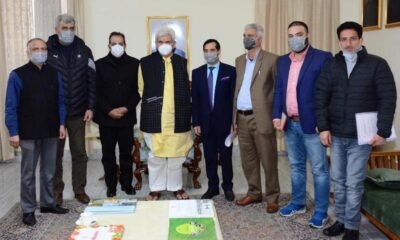

 Industry4 years ago
Industry4 years agoFCIK hails LG Sinha for creating entrepreneur-friendly industrial ecosystem
-



 Economy2 years ago
Economy2 years agoGlobal eCommerce boom and local traders of Kashmir
-

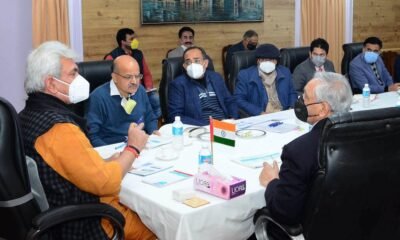

 Energy4 years ago
Energy4 years agoLt Governor discusses J&K power scenario with experts
-

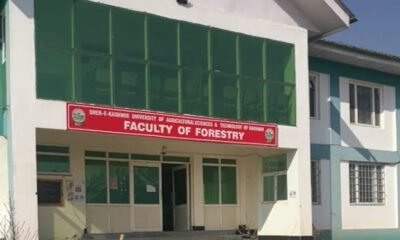

 Infra4 years ago
Infra4 years agoSKUAST-K bags EU project for urban green infrastructure
-

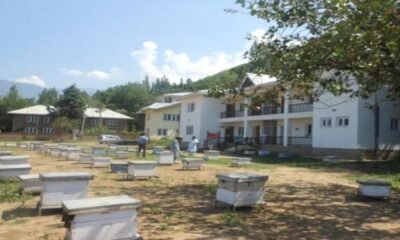

 AgriBiz4 years ago
AgriBiz4 years agoSKUAST-K to set up 3 honey testing labs in Kashmir
-



 Jobs4 years ago
Jobs4 years agoJ&K Govt holds Industry Connect Meet-Himayat 2020
-

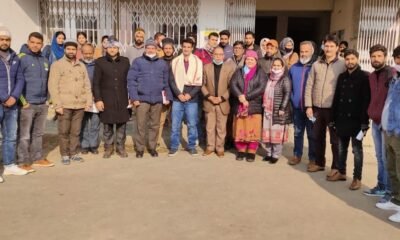

 Careers4 years ago
Careers4 years agoSKUAST-K holds career counselling at Wadura campus
-



 Economy4 years ago
Economy4 years agoLt Governor announces new industrial policy for J&K

